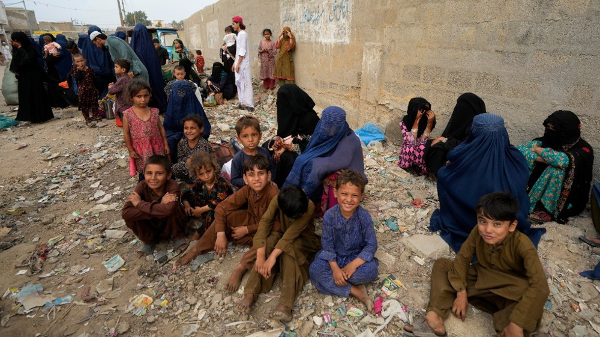
Children wait to board a bus to depart for their homeland in Afghanistan Oct. 6, 2023, Karachi, Pakistan. (Photo by AP)
The United Nations has warned Pakistani officials against Islamabad’s recent decision to deport millions of Afghans from the country by the end of the month.
The UN warned Pakistani officials on Saturday that deporting refugees constitutes a human rights violation.
The United Nations High Commissioner for Refugees (UNHCR) and the International Organization for Migration (IOM) jointly called on the country to suspend forcible returns of Afghan nationals and ensure any possible returns to the country take place in a safe, dignified and voluntary manner.
In the joint statement issued from Bangkok, the two refugee agencies warned that Islamabad’s plans would have serious implications for all who have been forced to leave the country and may face serious protection risks upon return.
The agencies added that the planned move could lead to severe human rights violations including the separation of families and deportation of minors.
UNHCR and IOM appreciate Pakistan’s generous hospitality towards Afghan nationals for over four decades, despite challenges, and repeats the call for all returns to be voluntary, safe and dignified - without any pressure, to ensure protection for those seeking safety, it said.
The forced repatriation of Afghan nationals has the potential to result in severe human rights violations, including the separation of families and deportation of minors, it further said.
Islamabad recently announced its crackdown on all undocumented migrants and refugees living in Pakistan illegally, ordering them to either leave the country at their own volition and return to their homeland by the end of this month, or face being arrested by police and forcibly sent away for good by authorities.
We have given them a deadline of November 1, Pakistan’s caretaker Interior Minister Sarfraz Bugti said on Tuesday, adding that nearly 4.4mn Afghan refugees live in the country - of which more than 1.7mn were undocumented.
Meanwhile, Pakistani landlords received notices ordering them to either evict illegal Afghans or face penalties. The government said it is setting up a hotline to offer cash rewards to those who inform them on the whereabouts of illegal migrants and refugees.
In response, the interim Afghan government led by the Taliban gave a stinging rebuke of Pakistan’s announcement, calling it unacceptable.
Government spokesperson Zabihullah Mujahid on Wednesday said in response to Bugti’s remarks, that the Pakistani government should reconsider the decision, and that Pakistan should tolerate them.
In the past, Pakistan has sent high-level delegations to Kabul for negotiations, urging the Afghan Taliban to improve border controls along the shared 2,640 km-long dividing line which passes through rugged mountains, densely forested valleys and narrow rock passages. Its topography makes it porous and difficult to control.
According to estimates, more than 95 percent of refugees in Pakistan, both documented and undocumented, are Afghan nationals.
The first influx of refugees to Pakistan began after the Soviet invasion of Afghanistan in 1979, which resulted in more than three million Afghans fleeing to Pakistan. Over the years, many of them returned home.
The second influx started in 2001 when the United States invaded Afghanistan after the September 11 attacks.
The third influx began in 2022 after the fall of Kabul to the Taliban in 2021.
Roughly 1.7mn Afghan refugees now live in Pakistan. Half of them live along the North-Western Frontier bordering Afghanistan in what is now the Khyber Pakhtunkhwa Province of Pakistan, and one-quarter of them live in Pakistan’s Baluchistan Province.
A report released in July by Refugees International, an independent humanitarian group that advocates for displaced people, said that since then more than 600,000 Afghans have fled to Pakistan.
LINK: https://www.ansarpress.com/english/27551
TAGS:






























 Farkhunda Buried, Ghani Appoints Fact-Finding Team
Farkhunda Buried, Ghani Appoints Fact-Finding Team




